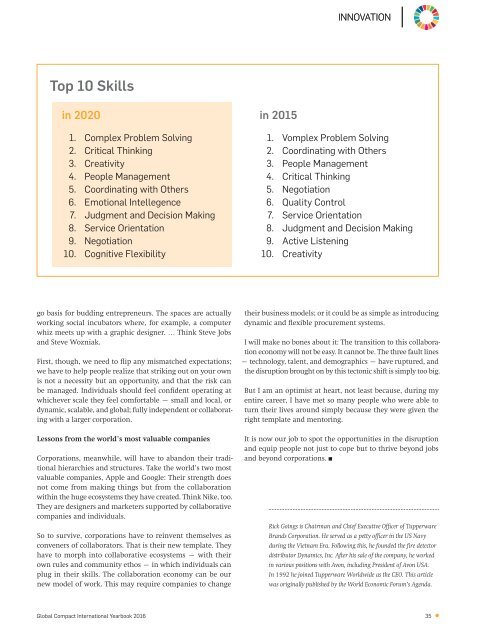Global Compact International Yearbook 2016
The Sustainable Development Goals are an ambitious agenda with 17 topics addressing the global challenges of our time. A key topic is innovation: Business must fit into planetary boundaries. This probably will not work with traditional business models. That is why we need new, fresh ideas. We need change, even when it happens in a rough, disruptive way. And the earlier the better. This is why the upcoming edition of the Global Compact International Yearbook, published in September 2016, has chosen sustainable innovation as the key topic. Also includes exclusive interviews with Angelina Jolie, Robert Redford and Sigourney Weaver. The Global Compact International Yearbook is with more than 500,000 readers one of the worlds leading CSR publications. Münster/New York 2016: 164 pages, paperback Publishing houses: macondo publishing/UN Publications Subscription (via UN Publications only): 30.00 USD (regular) 15.00 USD (reduced) ISBN13: 978-3-946284-01-7 / ISSN-Print: 2365-3396 / ISSN-Internet: 2365-340x
The Sustainable Development Goals are an ambitious agenda with 17 topics addressing the global challenges of our time. A key topic is innovation: Business must fit into planetary boundaries. This probably will not work with traditional business models. That is why we need new, fresh ideas. We need change, even when it happens in a rough, disruptive way. And the earlier the better. This is why the upcoming edition of the Global Compact International Yearbook, published in September 2016, has chosen sustainable innovation as the key topic.
Also includes exclusive interviews with Angelina Jolie, Robert Redford and Sigourney Weaver.
The Global Compact International Yearbook is with more than 500,000 readers one of the worlds leading CSR publications.
Münster/New York 2016: 164 pages, paperback
Publishing houses: macondo publishing/UN Publications
Subscription (via UN Publications only): 30.00 USD (regular) 15.00 USD (reduced)
ISBN13: 978-3-946284-01-7 / ISSN-Print: 2365-3396 / ISSN-Internet: 2365-340x
Create successful ePaper yourself
Turn your PDF publications into a flip-book with our unique Google optimized e-Paper software.
innoVAtion<br />
Top 10 Skills<br />
in 2020<br />
1. Complex problem Solving<br />
2. Critical thinking<br />
3. Creativity<br />
4. people Management<br />
5. Coordinating with others<br />
6. emotional Intellegence<br />
7. Judgment and Decision Making<br />
8. Service orientation<br />
9. Negotiation<br />
10. Cognitive Flexibility<br />
in 2015<br />
1. vomplex problem Solving<br />
2. Coordinating with others<br />
3. people Management<br />
4. Critical thinking<br />
5. Negotiation<br />
6. Quality Control<br />
7. Service orientation<br />
8. Judgment and Decision Making<br />
9. active listening<br />
10. Creativity<br />
go basis for budding entrepreneurs. The spaces are actually<br />
working social incubators where, for example, a computer<br />
whiz meets up with a graphic designer. … Think Steve Jobs<br />
and Steve Wozniak.<br />
First, though, we need to flip any mismatched expectations;<br />
we have to help people realize that striking out on your own<br />
is not a necessity but an opportunity, and that the risk can<br />
be managed. Individuals should feel confident operating at<br />
whichever scale they feel comfortable – small and local, or<br />
dynamic, scalable, and global; fully independent or collaborating<br />
with a larger corporation.<br />
Lessons from the world’s most valuable companies<br />
Corporations, meanwhile, will have to abandon their traditional<br />
hierarchies and structures. Take the world’s two most<br />
valuable companies, Apple and Google: Their strength does<br />
not come from making things but from the collaboration<br />
within the huge ecosystems they have created. Think Nike, too.<br />
They are designers and marketers supported by collaborative<br />
companies and individuals.<br />
So to survive, corporations have to reinvent themselves as<br />
conveners of collaborators. That is their new template. They<br />
have to morph into collaborative ecosystems – with their<br />
own rules and community ethos – in which individuals can<br />
plug in their skills. The collaboration economy can be our<br />
new model of work. This may require companies to change<br />
their business models; or it could be as simple as introducing<br />
dynamic and flexible procurement systems.<br />
I will make no bones about it: The transition to this collaboration<br />
economy will not be easy. It cannot be. The three fault lines<br />
– technology, talent, and demographics – have ruptured, and<br />
the disruption brought on by this tectonic shift is simply too big.<br />
But I am an optimist at heart, not least because, during my<br />
entire career, I have met so many people who were able to<br />
turn their lives around simply because they were given the<br />
right template and mentoring.<br />
It is now our job to spot the opportunities in the disruption<br />
and equip people not just to cope but to thrive beyond jobs<br />
and beyond corporations.<br />
Rick Goings is Chairman and Chief Executive Officer of Tupperware<br />
Brands Corporation. He served as a petty officer in the US Navy<br />
during the Vietnam Era. Following this, he founded the fire detector<br />
distributor Dynamics, Inc. After his sale of the company, he worked<br />
in various positions with Avon, including President of Avon USA.<br />
In 1992 he joined Tupperware Worldwide as the CEO. This article<br />
was originally published by the World Economic Forum’s Agenda.<br />
<strong>Global</strong> <strong>Compact</strong> <strong>International</strong> <strong>Yearbook</strong> <strong>2016</strong> 35

















